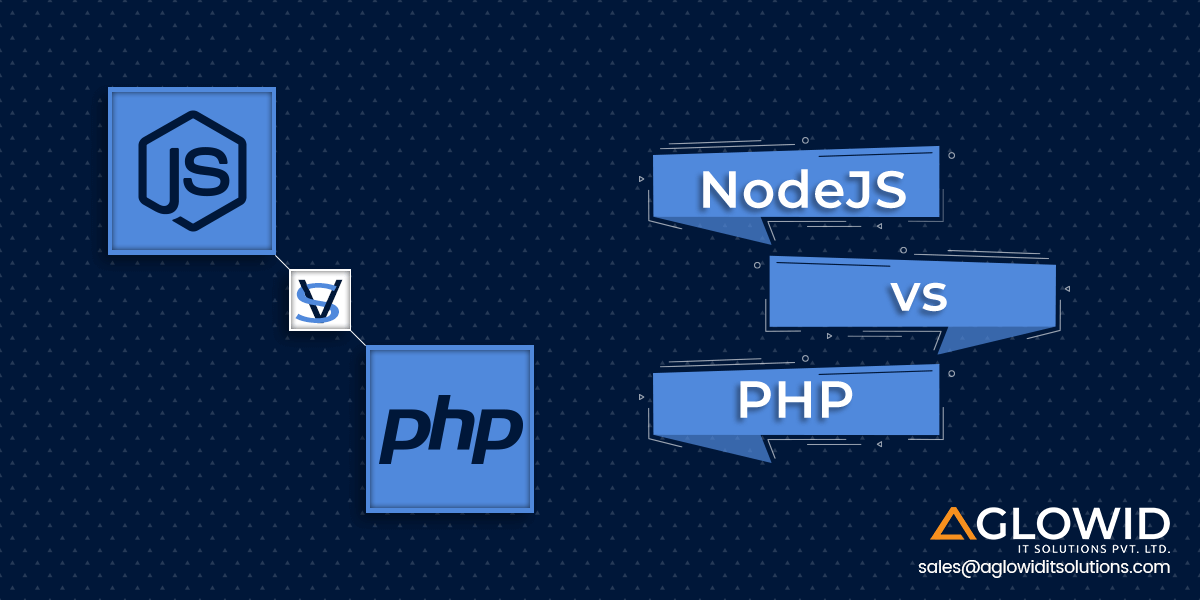Quick Summary: Both PHP and NodeJS are promising and useful tools for server-side development. They follow different approaches to achieve the same result and yet manage to outperform each other repeatedly. Does the gap between the ages of both these popular frameworks tip the scale towards PHP? Or does the modern approach makes NodeJS more relevant and convenient in today’s fast-paced market? Find out in our PHP vs NodeJS detailed comparison breakdown.
A website or web app is always powered by a technology stack that has many virtual layers. The two main layers that matter the most are – the backend and the frontend.
Frontend refers to the web app elements that a user sees and interacts with. The backend development practices are the underground operations that remain invisible to the users.
PHP and NodeJS are two of the most powerful backend technologies for building a dynamic website or web app.
However, even if these technologies fall under the same category, they have many unique and distinct features and approaches.
So how do you choose which is right for your web app requirements?
PHP vs Node.js – which one is better?
PHP vs NodeJS – Current Scenario
Before we start comparing PHP vs NodeJS based on how they function and hold up against each other in different key areas, we should first get an understanding of their overall popularity and relevance in the current market –
1. Node.js vs PHP – Market Share:
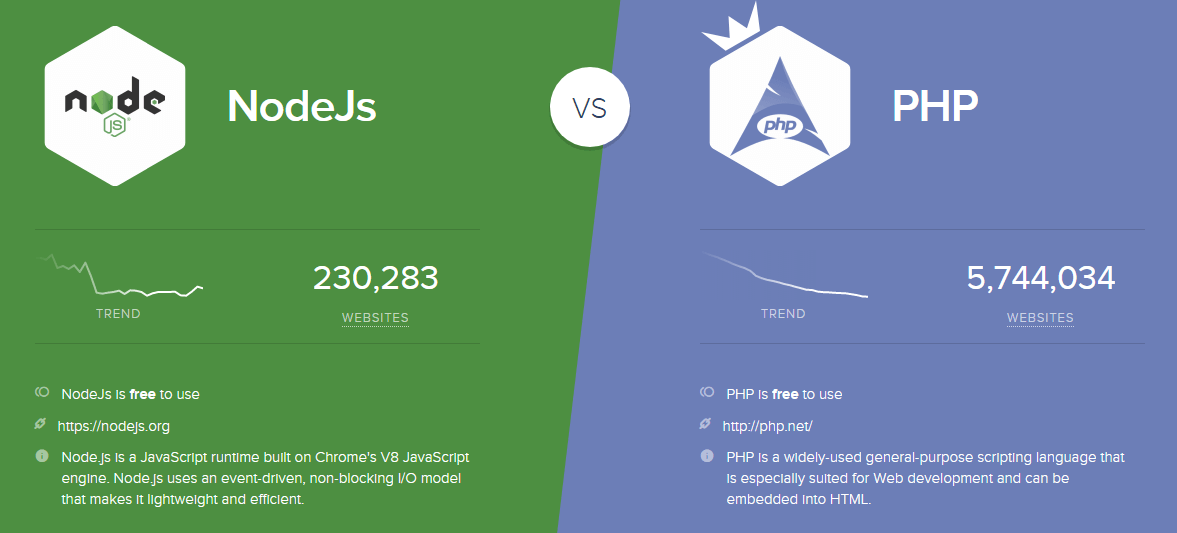
When it comes to market share, PHP is leaps and bounds ahead of NodeJS.
282,931 (1.11%) are the total number of websites currently active on Node.js.
6,738,805 (34.88%) are the total number of sites currently active on PHP.
This comparison does not account for the fact that PHP has been in the market since 1995, whereas NodeJS came out in 2009.
Even though NodeJS is new, it has seen a substantial rise in demand and popularity amongst developers and business owners in the past couple of years.
2. Node.js vs. PHP – Popularity:
PHP
PHP has gained unparalleled popularity over the years, as it is an interpreter language and does not need code compilation like C++ or Java.
It gives the developers great flexibility when directly using HTML. The shared hosting providers also prove to be economical, which makes deployment easier.
PHP powers the backend of 80 percent of all websites on the internet.
Node.js
NodeJS is the first framework to bring JavaScript to backend development. It utilizes the non-blocking I/O mechanism, which delivers better performance.
NodeJSis rapidly gaining acceptance amongst the web developers’ community.
It has a highly collaborative and active GitHub community.
3. PHP vs Node Ecosystem
PHP has been in the industry since 1995. Over the years, it has gathered a strong community and has endless portfolios for projects.
There are many training materials available for PHP developers and a vast repository of PHP solutions like frameworks and WordPress, making PHP development a piece of cake.
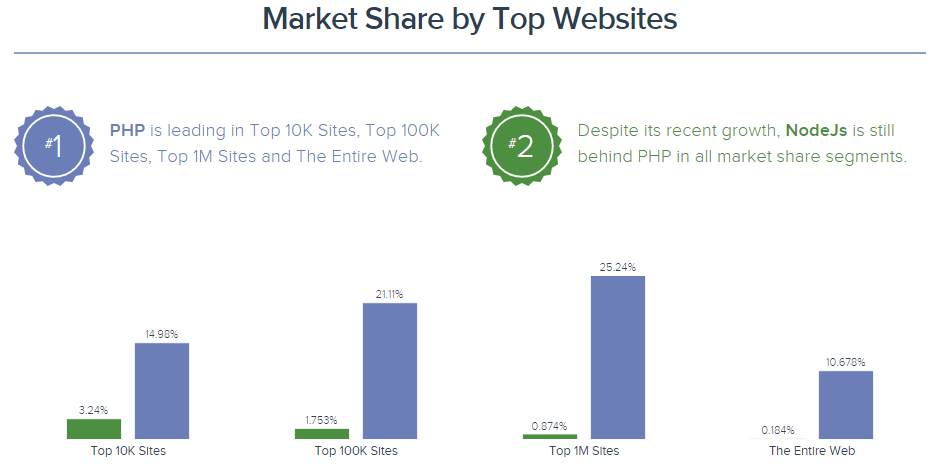
This allows developers to cut down on costs and time of growth while increasing their overall productivity.
Node.js, on the other hand, is still young comparatively, and hence its community is not at par with PHP.
However, it is an open-source, self-motivated, result-oriented, and enthusiastic community. The biggest library also backs it – NPM Registry.
NPM Registry is a collection of packages of open-source JavaScript application solutions.
4. Node vs PHP– Salary
According to Glassdoor, the average PHP developer salary is –

According to Glassdoor, the average Node.js developer salary is –

5. PHP vs NodeJS – Popular websites
Both PHP and NodeJS are proven frameworks that power many popular websites and web apps that we use in our day-to-day lives.
Let us have a look at the list of popular websites that PHP and Node.js power.
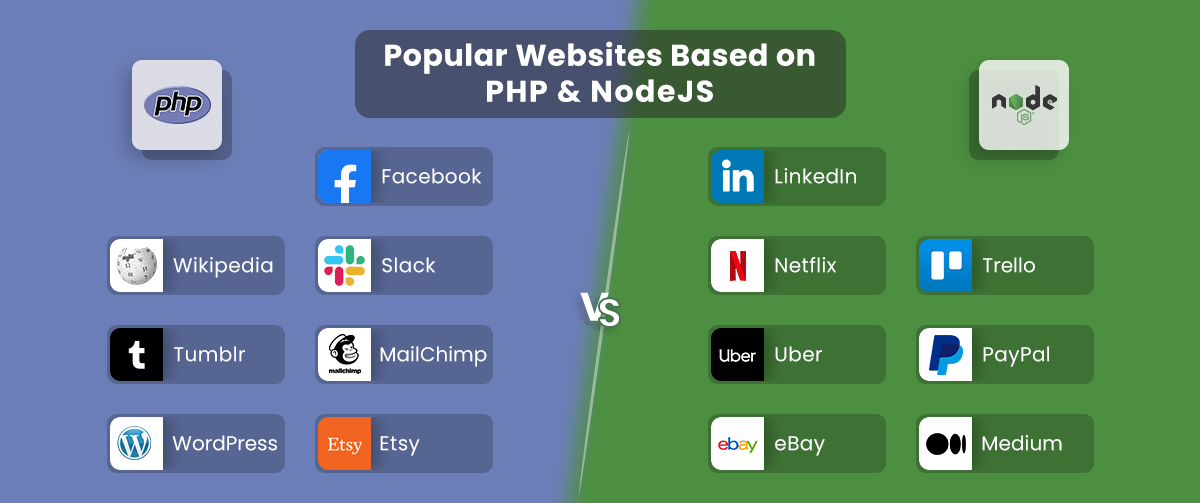
| PHP | NodeJS |
|---|---|
| Wikipedia | Netflix |
| Slack | Trello |
| Tumblr | Uber |
| MailChimp | PayPal |
| WordPress | eBay |
| Etsy | Medium |
Differences between PHP vs NodeJS
Now that we have understood why PHP and Node.js are so widely popular, we should look at how these two technologies differ in their approach to backend development. There are two key differences between PHP and Node.js.
Let us understand how these differences help both technologies to be efficient in managing backend development.
1. Synchronous vs Asynchronous
PHP uses synchronous code, whereas Node.js uses asynchronous code. The best way to explain synchronous vs asynchronous operations is to understand it with a real-life scenario.
Synchronous operations are when you stand in a line at a grocery shop for checkout after buying all items you need. You cannot pay for your grocery unless the person ahead of you in the sequence gets done with their payment.
Opposed to this, asynchronous operations are when dining at a restaurant, and multiple servers simultaneously serve multiple tables.
Similarly, synchronous code is executed line after line. Only after the first line is successfully executed will it move on to the next line.
Whereas asynchronous code is executed simultaneously, a program doesn’t need to wait for the first line of code to be executed before it runs.
Now that we understand the basic differences between sync and async operations let us interpret what they mean for developers –
- Sync operations function in a way where the process will only move forward after successfully running one line of code and then move on to the next. This could create bottlenecks and cause the overall operations to be slowed down significantly when we use sync operations for bigger or enterprise solutions.
- Same situation, async operations will allow all processes to initiate simultaneously until the entire operation gets completed. This can increase the speed of implementation and processes.
However, if there is an issue with the code, then –
- Sync operations will limit the operations to the place where the error is detected, which will help avoid bigger problems.
- Async operations will still allow all processes to run simultaneously, affecting the completion of other tasks.
Hence, choosing between synchronous vs asynchronous operations comes down to your preference for reliability and speed for your web applications.
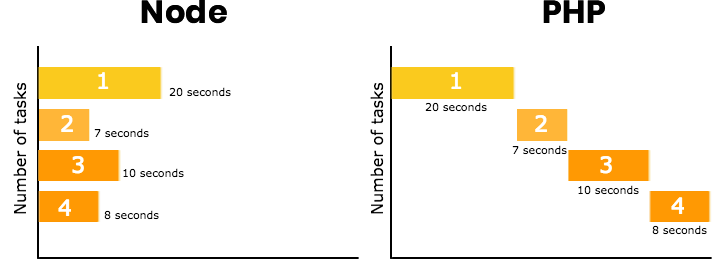
2. Modules vs Packages
Another major difference between PHP and NodeJSis how they operate with other tools. PHP developers can use Composer or PEAR for their PHP operations, whereas Node.js utilizes a single tool called NPM.
PEAR works with reusable components, and Composer works with dependency management. Node.js utilizes NPM, which acts as a comprehensive management system, where you can download any Node.js component that you need.
Hence, developers need to rely on multiple tools for getting all the necessary elements to complete a project for PHP to work.
In contrast, with Node.js, you can get all the necessary elements using one tool.
Side by Side Comparison – PHP or NodeJSfor Backend Development
Now that we understand the basic differences in the backend development approaches taken by both PHP and NodeJS, we can compare and test them against each other in an ultimate showdown based on some of the most important factors that affect backend development.
This will help you understand their potential and limitations better, which will allow you to make an informed decision between the two for your project.
1. PHP vs Node.js Database
Databases and database handling are one of the most important aspects of an efficient backend development process.
Let us look at how PHP and Node approach database and database handling –
PHP
PHP most often makes use of traditional or relational databases like MySQL, MariaDB, and PostgreSQL.
Some methods allow developers to use NoSQL databases with PHP. However, it is not a frequent practice in the industry. PHP comes with pre-built database support.
NodeJS
Node.js works well with traditional databases; however, the overall market trend is moving towards using NoSQL databases like MongoDB and CouchDB.
SQL databases are prone to challenges like cross-site scripting, SQL injection, and other attacks. NoSQL injection attacks are also a registered threat for NoSQL databases.
Still, the chances of such attacks are much lesser than in SQL databases.You have to install databased via npm libraries.
2. PHP vs Node.js Coding
Every technology follows a different set of guidelines and principles based on its best practices for coding. Having a coding standard is mandatory as other developers work on other modules using the same technology.
If all developers start inventing their standards, then the overall coding will be messy and unmanageable.
Benefits of having proper coding principles are –
- Easier for your peers to understand your code.
- Helps achieve clarity and simplicity.
- Code revision helps improve code readability.
PHP Coding
PHP has upgraded and improvised significantly over the years it has been in themarket. PHP seems to require a lesser line of codes for performing any functions, which gives a perception that it follows easier coding practices.
However, for utilizing PHP,you also need to be fluent in how its operators and generators work in the HTTP server, Apache HTTP, MySQL, and PHP.
Node.js Coding
The general perception towards Node.js is that it utilizes more lines of codes to carry out basic functions.
However, what makes Node.js coding much more convenient compared to PHP is that you do not need to remember syntaxes of different languages as the entire development environment is based on JavaScript.
Hence, using only one language is easier for developers to grasp, even at the cost of an extra line of codes.
3. Node vs PHP Hosting
Hosting services are important as they dictate the quality of services your website/web app can provide to your users.
Hosting is used in many aspects like – systems, blogs, virtual stores, and websites.In addition, a good hosting service ensures access for the entire public to virtual addresses.
Different types of website hosting –
| Type of Hosting | Description |
|---|---|
| Shared Hosting | User shares server spaceand other resources with other websites. |
| Free Hosting | Users get free hosting services if they place advertisements on their websites. |
| VPS – Virtual Private Server | Virtual machine sold as a server by any Internet hosting service. |
PHP Hosting Services
One of the major reasons most global clients prefer PHP is that many hosting services support it compared to Node.js.
This helps to make the deployment and integration process of PHP much easier than Node.js.
Though PHP is designed to be supported by most hosting services, it isn’t necessarily the most secure hosting technology stack.
NodeJS Hosting Services
NodeJS is a runtime server environment for server-side Java applications. Node.jscan be run on cheap or shared servers.
However, if you don’t have budget constraints, VPS and dedicated servers are a better choice.
To integrate hosting services in your Node.js project, you need to call a virtual server with SSH access for running applications.
4. PHP vs. Node.js Performance & Speed
As we already discussed, PHP and Node.js both have different approaches in handling web requests.
PHP relies on a synchronous code structure, which means all instructions pass in a hierarchal and linear manner, whereas Node.js uses an asynchronous code structure where multiple processes can run simultaneously.
PHP File Request Handling Process –
- PHP sends a query to the computer’s file system.
- Waits for the file system to open and read the query.
- Fetches the content and returns it to the client.
- Takes up the next code line and repeats the process.
Node.js File Request Handling Process –
- js sends a query to the computer’s file system.
- Works on the next query without waiting for the first one to be resolved.
- After the file system opens and reads the requested file, the server sends the content back to the client.
5. PHP vs Node.js Language Switches
One of the biggest conveniences that Node.js brings to its developers is the consistency of using JavaScript in both frontend and backend development.
As opposed to this, PHP is mainly built for backend development. It utilizes LAMP Stack – Linux, Apache, MySQL, and PHP for addressing all development needs.
Hence, though PHP has a full-stack solution in place, NodeJS provides much more convenience by allowing developers to use one programming language across frontend and backend development.
6. PHP VS Node.js Scalability
None of the app development frameworks are built not to be scalable. However, some frameworks are better suited and have a higher caliber to build scalable solutions than others.
Scalability is an important aspect of any project. If your website isn’t built to be scalable and your website traffic and popularity increase, your website won’t handle the increased demands of your users.
PHP Scalability
PHP is supported across various popular CMS services like Drupal, CodeIgniter, Joomla, and WordPress.
Hence, developers generally prefer building their websites using PHP as they can easily migrate between popular CMS services without any hassle if needed.
However, as we discussed earlier, PHP requires higher than average proficiency in many languages, difficult to find.
Node.js Scalability
Node.js takes a more specific approach. It is a great tool for building scalable, dynamic solutions that function with various I/O operations.
You can scale Node on multi-core systems, but it’s usually not worth the effort in the general marketplace.
However, Node.js allows developers to code in JavaScript for both frontend and backend, making the overall project easier to function with.
7. Node vs. PHP Request Handling
Request handling is a measure of how swiftly any technology processes client-side requests. Of course, it is important to execute the client-side bid as fast as possible, but at the same time, it should also do so by utilizing minimum resources.
To understand both PHP and Node’s approaches to request handling, we can examine their error handling practices.
PHP Error Handling Approach
We have already discussed PHP handles one request at a time. Subsequently, it utilizes more resources on RAM and CPU.
This approach helps prevent cross-contamination of errors but at the cost of creating a lag in the system.
Node Error Handling Approach
In contrast, since Node utilizes asynchronous processing of multiple requests, CPU and RAM times are reduced significantly.
However, this is at the cost of any error interfering with other requests, creating system-wide errors.
Pros and Cons – PHP vs Node.js
Now that we have bided PHP and Node against each other on various comparison points, we should understand the advantages and limitations of PHP and Node for backend development.
| Backend Development | Pros | Cons |
|---|---|---|
| PHP |
|
|
| Node |
|
|
Which one to use – Node.js or PHP?
Both Node and PHP are capable and useful backend development technologies that can help you with your business projects.
However, since they both have different website and web app development approaches, they also have different practical applications.
When to use Node over PHP
1. When you want to use the same language across the stack.
For creating dynamic SPA, which requires MEAN stack development software, Node.js is an excellent choice.
2. When your project deals with real-time data.
Node.js is ideal for projects that require real-time data.
3. When you prioritize speed.
As we already discussed, Node.js follows asynchronous coding practices that promote a faster development process.
When to use PHP over Node
1. When you have a centralized server.
PHP is ideal for your project if your application only has a centralized server and doesn’t require scaling on multiple servers.
2. When you need portability and ease of migration.
If you consider the chances of shifting your CMS, database system, or other such tech stacks, PHP has a wider acceptance and support with such tech stacks.
PHP vs Node.js – Quick Overview
| Features | PHP | Node.js |
|---|---|---|
| About | Designed by RasmusLerdorf and developed by The PHP Development Team at Zend Technologies, PHP is the world’s largest open-source server-side scripting language. | Written and published by the top celebrated software engineer Ryan Dahl, Node.js is an open-source JavaScript runtime environment to develop dynamic network applications. |
| Released Date | First appeared in 1995 | Node.js was publically released on May 27, 2009 |
| Latest Stable Release | PHP 8.0 | Node.js 16.7.0 |
| Type | General Purpose Programming Language | Runtime Environment |
| MVC Frameworks | Koa JS, Express JS, Sails JS | Symfony, Laravel, Yii, Codeigniter, Zend, Phalcon, CakePHP |
| Community Support | PHP has larger community support compared to Node.js | Has smaller community support compared to PHP |
| Documentation | PHP.NET | Nodejs.org |
| GitHub Stars | 31.1k | 80.9k |
| Runtime Environment | Built-in features which can be used on Server-Side development | Node.js itself is a runtime environment for JavaScript on the server-side |
| Powered by | Zend engines | Google Chrome’s V8 engine |
| Complexity | PHP is not difficult to use, but it has built-in functionalities that one needs to learn. | Node.js is easy to use due to its support for JavaScript in backend development. |
| JSON | json_encode() and json_decode() functions used by PHP which is not as good as that of Node | JSON.stringify() and JSON.parse() used by Node which work better with it compared to PHP. |
| Code Execution | PHP uses Synchronous programming for code line execution | Node uses Asynchronous programming for code execution |
| Execution Speed | Execution is slightly slow compared to Node.js | Execution is faster and lightweight |
| Web Server | In the general case, PHP uses an Apache web server, and if it is to be used on the window, then the IIS web server comes into use. | As it’s a runtime environment, it does need a Web server to run |
| Package Manager | Composer | NPM (Node Package Manager) |
“Still in Dilemma of Choosing Right Technology for your Website”
Consult our Web Experts Now!
Wrapping it up!
The world of web development is flexible and filled with many great options for getting your ideal website ready to wow your customers.
You can use Node.js with PHP or choose between Node.jsor PHP based on our considerations in this blog.
Each technology has some specialization features to offer. You just have to identify the one that matches your requirements.
Refer to this blog for understanding the individual offerings and the differences between Node.js and PHP.
Also Check:
